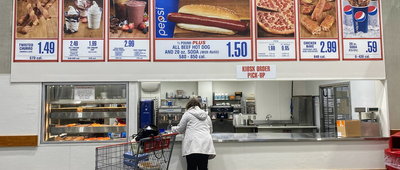Most of us stay connected to the Internet through smartphones, but when it comes to getting work done on the go, phones aren't the most convenient tool. What you really need is a low-cost mobile hotspot (MiFi) for a reliable Internet connection. There are many options out there, so use this guide to help you choose the best cheap plan.
Among the hotspot service providers are some familiar names, including telecommunications giants like AT&T and popular pay-as-you-go phone companies like StraightTalk, as well as hotspot-exclusive players, such as Karma. When comparing the offerings, take note of the coverage area and the connection speed. Also figure out which device best suits your needs. And then consider the following:
Cost.
There are two cost components of a mobile hotspot: the device and the data plan. The MiFi device costs $80 to $200. Connection capabilities, size and weight, speed throughput, and extra features (e.g., automatically going into sleep mode when not in use) account for the price variance. The data plans are the real money-sinks, and as is the case with cell phone plans, the large carriers with their two-year contracts are generally the most expensive.
| AT&T | Free-$49.99 (with two-year contract), $149.99-$199.99 (no contract) | 10-15 | AT&T 4G LTE | N/A | 5GB: $50 |
| FreedomPop | $99-$199 | 5-8 | WiMax 4G LTE or Sprint 3G/4G LTE | $.015/MB - $.02/MB | 500MB: free or $3.99, 2GB: $19.99, 5GB: $34.99-$39.99 |
| Karma | $149 | 8 | Sprint 3G/4G LTE | 1GB: $14, 5GB: $59, 10GB: $99 | N/A |
| StraightTalk | $79.99 | 5 | Verizon 3G | 1GB: $15/30 days, 2GB: $25/30 days, 4GB: $40/60 days, 5GB: $50/60 days , 7GB: $75/60 days | N/A |
| Verizon Jetpack | $0.99-$49.99 (with two-year contract), $149.99-$229.99 (no contract) | 8-15 | Verizon 4G LTE | 250MB: $15/week (no contract) | 3GB: $60 (no contract), 5GB: $50 (with contract), 10GB: $80 (with contract), 10GB: $90 (no contract) |
| VirginMobile | $71.99-$79.99 | 5-10 | Sprint 3G/4G LTE | 250MB: $5/day | 1.5GB: $25, 6GB: $55 |
With lesser-known providers, however, you can dodge the contract and land a cheap price. These MiFi providers have been relying on the Clearwire (now Sprint) WiMax network, which delivers slower service than LTE. But WiMax is being replaced by Sprint 4G LTE, a changeover that is nudging prices upwards. Note that older hotspot devices made for the WiMax network won't be functional after November 6, 2015. Many carriers have already switched to the latest LTE-compatible devices and are offering upgrade deals to current customers. If you see a hotspot price that looks too good to be true, beware: the device may work only on WiMax.
Among the MiFi packages we researched, the one offered by Karma stands out. A price of $14 for 1GB is the least expensive pay-as-you-go data plan. Moreover, the data allocation never expires, as it does with other mobile hotspot providers. Better yet, Karma users get additional free data by sharing the connection; when someone else connects using your Karma hotspot, the guest has access to 100MB and you earn an extra 100MB – for free. The bad news: The Karma network is open (no password protection), which is a major security flaw.
StraightTalk fees are similar but Internet access comes through the slower Verizon 3G network and data allocation comes with an expiration date. FreedomPop allots up to 500MB each month for free and charges $19.99 per GB after that. (Overage with other plans, by contrast, costs only about $15 per GB.) It offers users the ability to earn more data by signing up for new services, filling out surveys through the online portal, or "borrowing" data from friends. Regardless, the additional data expires at month's end unless you shell out $3.99 per month for rollover service.
Battery Life.
With any mobile electronic device, battery life is a crucial consideration. The wide range of MiFi devices makes it impossible to provide specific details here. Suffice it to say that some cheap hotspots last up to five hours, which is sufficient for connectivity here and there but not for an all-day work session. Verizon's Jetpack MiFi 6620L, though, survives up to 20 hours and even doubles as a universal portable charger for other electronic devices.
Bandwidth.
USB stick-style hotspots are an appropriate choice if you only need to connect a single laptop. A MiFi hotspot, by contrast, can connect several devices simultaneously; phone and laptop, for example, or a colleague's electronic gadget along with yours. The budget hotspot options we compared allow a minimum of five connections at once, and several devices handle up to 15. Even the latest 4G LTE technology has its limits, though, and with several devices connected (especially if one is streaming video), transmission speeds will drop for everyone.
Smartphone Alternative.
You may wonder why you need another device or plan when you already have a smartphone in your pocket. Indeed, many smartphones are capable of turning themselves into a mobile hotspot, but your carrier may monitor usage or actually disable tethering unless you have a tiered usage plan (i.e., not an unlimited plan) and still may charge extra to tether. Regardless, be wary of quickly using up limited data and remember that tethering rapidly drains the battery while broadcasting.
The Best Option for Frugal Consumers.
Most of the cheaper MiFi options run on Sprint's network and if you don't have coverage near home or work, even free data is useless. If you already have a data plan for your smartphone, it may make sense to add a hotspot and increase the data limits. Although this strategy may not be the cheapest, you'll know where service is available. If Sprint works for you and security is a non-issue, Karma's delivery of free or cheap data that never expires could be the plan for you. FreedomPop's inexpensive monthly MiFi plans, with opportunities to earn more data or pay low overage charges, are also appealing.








